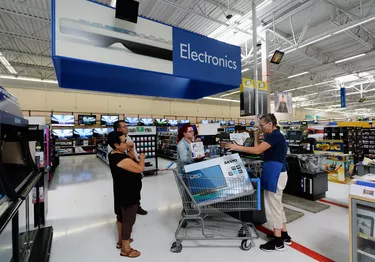
Shoppers make purchasing decisions based on a variety of factors, including price, brands, customer service and product features. Learning more about shopping strategies can help consumers maintain budget and finance goals. Understanding the different types of shoppers can also help business owners perfect marketing strategies and maximize profits.
Economic Shoppers
Video of the Day
Economic shoppers focus primarily on the price of items when determining which products to purchase. This group includes people on a tight budget or fixed income, as well as consumers who may have a larger budget but still choose to focus on low prices. For some, this means choosing store-brand items or any items with the lowest price. For others, this means attempting to maximize value by choosing name-brand, high-quality items that offer the lowest cost over time. Economic shoppers often look for stores with a large variety, such as big-box retailers that make it easy to compare prices on a large selection of products.
Video of the Day
Personalizing Shoppers
Personalizing shoppers value personal relationships over low prices. These customers focus on building relationships with store personnel and often shop close to home. They look for great customer service, which is often found at smaller or local stores compared to big-box retailers. This type of shopper is willing to pay a premium for better service and a better shopping experience.
Ethical Shoppers
Ethical shoppers base shopping decisions on factors other than price and their own personal experience in the store. Shoppers in this category feel morally obligated to support their own beliefs while shopping and are willing to pay a premium to retailers that fit these beliefs. This may include supporting neighborhood merchants over large chain retailers. It may also extend to supporting retailers who support environmental or religious beliefs.
Apathetic Shoppers
Apathetic shoppers have no interest in shopping and do so only out of necessity. These consumers try to minimize shopping time by getting into and out of a store as quickly as possible. According to the Association for Consumer Affairs, this shopper type may be further refined into two separate categories. This includes convenience shoppers, who truly are pressed for time and must shop quickly, as well as apathetic shoppers who simply dislike shopping.
Other Types
While much research in this field supports these four basic shopper types, some analysts have also introduced new types beyond these four categories. These include dedicated fringe shoppers, who always strive to have the latest and greatest products. These shoppers look for innovation and research shopping options thoroughly before buying. The need to find the latest products often means these shoppers buy online or through catalogs rather than in the store.
Another type of shopper, the transitional shopper, includes young families that have yet to find their shopping niche. These shoppers may be influenced by retailers or other factors to choose one of these shopping types.